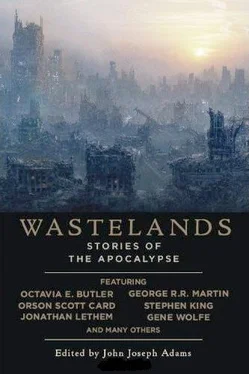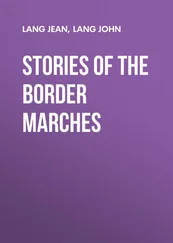After dinner, Natasha and I sit on top of the cargo container watching a field full of cop cars sink slowly into a newly risen tar pit. Everyone from the docks is there. We give might Whoop! as the last car slides, bubbling, below the surface.
Will the last person on the planet please turn off the lights?
Artie’s Angels
by Catherine Wells
Catherine Wells is the author of several books, including the post-apocalyptic novel Mother Grimm and the Coconino trilogy: The Earth is All That Lasts, Children of the Earth , and The Earth Saver . Her latest is Stones of Destiny , her first foray into historical fiction. Her short fiction has appeared in Asimov’s and Analog , and the anthologies Redshift and The Doom of Camelot .
This story, which first appeared in Realms of Fantasy , was inspired by a disturbing dream Wells had more than 30 years ago. In the dream, a young man shimmied up a drainpipe in a tenement to visit his friend; and although he was a good person, someone came to his bicycle shop and fired a shotgun through the plate glass window. The senselessness and injustice of that dream event haunted Wells, and years later, as she rode a tandem bicycle along the back roads of Arizona, she imagined a post-apocalyptic society involving bicycles and young man such as the one in her dream, and “Artie’s Angels” was the result.
When you set out to perpetrate a lie, I suppose it’s counterproductive to write down the truth like this. But whatever population survives here on Earth is not likely to read this, much less believe it. Most of them can’t read anymore as it is—not BookEnglish, anyway—and it will probably get worse before it gets better. Much, much worse.
My birth name is Faye, but I have not used it since I was ten. That’s the year we moved inside the radiation shield, into a wreck of a building in Kansas Habitat. My mother cried, because my little brother died just before we got there, and she kept moaning that if only we’d gotten inside sooner, he might have lived. But you had to have either money or skills to get inside the radiation shield, and my parents had neither. So we fried our skins and our eyeballs in Earth’s unfiltered sunlight until enough rich people moved offworld to make room for us under the shield.
Artie knocked at my window the first night; he’d shinnied up the drainpipe from his apartment just below. The artificial rain no longer worked in our sector, of course, because the infrastructure was well on the road to hell, but the drainpipe was still there. Artie D’Angelo was this skinny kid, just my age, a little goofy-looking, but agile as a monkey. When I saw him hanging on that drainpipe, I was more amazed than frightened. “Hi!” he said through the glass, grinning widely. He had dark, curly hair, deep brown eyes, and big ears.
I climbed onto my bed, which was under the window, and stared at him. “You gonna open up?” he asked. “Or let me hang on this drainpipe all night?”
With a glance over my shoulder to make sure my door was shut, I lifted the sash and Artie climbed in. “I’m Artie,” he introduced. “I live downstairs.”
“Faye,” I replied. “You can’t use the door?”
“I knocked before,” he said, “but no one would answer.”
I knew the cause of that. “My dad’s scared to open the door,” I told Artie.
He shrugged. “In this neighborhood, you’re better off. But I saw you moving in, and I thought you must be from outside, so you’d probably need someone to show you around.”
During the next months, Artie did just that. Born in KanHab, he knew its grid upground and under. If not for his tutelage, I would probably have died in that first year. By the time they got around to letting dregs like my family in, half the sectors were more or less lawless, and a 10-year-old kid could easily get snuffed if she didn’t know where to run and where to hide. Artie taught me that and more. In those early days, he was my salvation; in these latter days, I shall be his.
It was while we were hiding from the Citizen Patrols in B4 that he first spoke the name I took as my own. That was back when the Sisters of Literacy still tried to run schools in B4, which was as close as they would get to B9 where Artie and I lived. School didn’t excite me, but Mom wanted me to go, and Artie insisted crossing into B4 was at least as safe as living in B9. Most of the time that was true, but not when the Citizen Patrols were out.
We knew there was going to be trouble that day, because Melissa’s desk had been empty at roll call, and word got around by recess that she’d been found in a trash bin, missing a few parts. So the Citizen Patrols were out that afternoon, looking for someone to punish. B9ers were a favorite target. Artie and I ran from shadow to shaft, upground and under, trying to stay out of their way. We watched from beneath an abandoned maintenance cart as they rousted three teenage boys playing hoops in the street.
The boys must have scanned as B4s, because the CPs started to walk away; but then one of the boys said something. Something dirty, and cruel. And a CP just shot him. With a crossbow, that is, because no pulse or projectile weapons were ever allowed in the habitats—too much danger of damaging the shielding. When the other two boys went for their knives, the CPs shot them, too.
I’d seen people die before—things were even worse outside than under the shield. But this was the first time I knew—I knew—if I twitched, I’d be next. One CP went over to kick the boys and make sure they were dead. Another one cut open the mouthy boy’s pants and sliced off his privates. “That’s for Melissa,” I heard him say, and he flung the bloody flesh across the street. It landed right beside the cart where we lay hidden.
The sight of it there, so close to my face, made me gag in horror. I stuffed my fist in my mouth to keep from screaming, and Artie pulled me to him, pushing my face against his scrawny chest and holding me tight. “Sh,” he breathed in my ear, knowing both how terrified I was, and how bad it would be if the CP heard us. “They can’t hurt you. They can’t hurt you, Faye, because—because you’re magic.”
I was so startled I stopped crying, wondering what in the dying world he was talking about. I couldn’t see the Civilian Patrol, the way he had me pressed up against him, but after a minute or two he let go of me so I knew they had gone. “What you say, magic?” I demanded in the barest of whispers, not knowing how far away they were.
“They left, didn’t they?” he whispered back. “Magic. You’ve got the magic name.”
I told him what I thought he was full of.
“Maybe,” he agreed, checking the street carefully to be sure it really was clear. “But your name, ‘Faye,’ that’s like Morgan LeFey, right?” He started to squirm out from under the cart.
I squirmed right after him. “Who?”
“King Arthur’s sister,” he said. “She was magic. She took Arthur to the Isle of Avalon where he couldn’t die.”
Later that night, Artie shinnied up the drainpipe to my room, and we sat there for hours in the dark while he told me stories of King Arthur and his knights: men who defended the helpless instead of victimizing them, men who fought against the villains of their age and inevitably prevailed. Not until many years later did I learn what a spin he put on the stories for me that night, to make me believe that once, there had been people who cared about the likes of me, who stood for justice and nobility of spirit, who made it honorable to protect the weak.
That night I took the name of Morgan, not because I ever believed it was magic, but because I wanted to be a part of that ideal. I needed the hope that King Arthur represented, and I saw it in my Arthur—Artie. To think of myself as his sister pleased me in a quiet, deep way I could not explain.
Читать дальше












